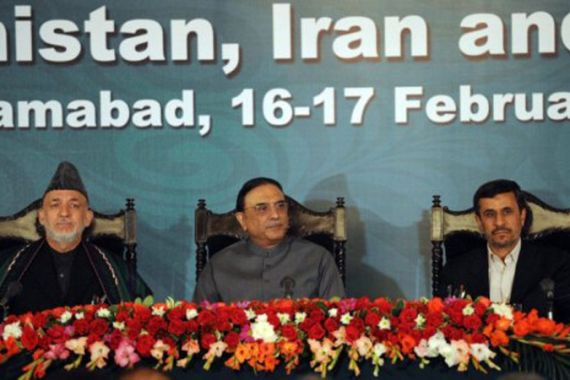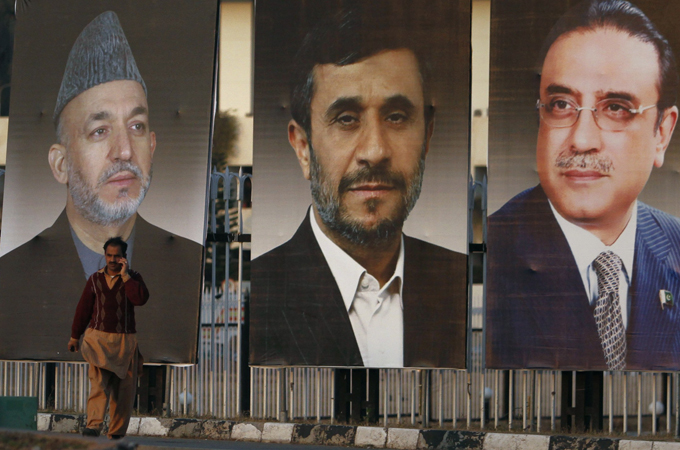Pakistan-Afghanistan talks ‘end in acrimony’
Reports say Karzai’s demand that Taliban chief be delivered to the negotiating table was dismissed as “preposterous”.

 |
| The leaders of Afghanistan, Iran and Pakistan met to discuss a range of regional peace efforts [Reuters] |
After two days of high-level talks with Iran and Pakistan, Afghanistan has failed to gain Pakistani support for its bid to advance its peace process with Taliban fighters.
Pakistan’s foreign minister told Afghanistan on Friday against having “ridiculous” expectations of what Pakistan could do to help Taliban peace negotiations, as talks between the two countries on the process ended in apparent acrimony.
The minister, Hina Rabbani Khar, said it was “preposterous” to think that Pakistan could deliver Taliban chief Mullah Omar to the negotiating table as Afghanistan has asked in the past, despite the Pakistani government’s alleged ties to the group.
The public comments were unusually harsh for the diplomatic world where such quarrels usually play out behind closed doors. Khar’s words demonstrated the depth of the frustration between the neighbouring countries as the war in Afghanistan enters its eleventh year.
Her words indicated a setback for a peace process that the US is strongly promoting as a way to end the Afghan conflict and allow it to withdraw most of its combat troops by 2014 without the country further descending into chaos.
‘Ridiculous expectations’
Pakistan is seen as critical to efforts to reach a settlement to Afghanistan’s conflict and is believed to have influence over Afghan anti-government groups.
“The talks were hard. But sometimes you need to have hard talks,” Khar said after the meetings.
Before Karzai arrived in Pakistan, Afghan officials said he would press Pakistan to provide access to senior Afghan Taliban leaders belonging to the so-called Quetta Shura, named after the Pakistani city where it is said to be based.
Pakistan has consistently denied giving sanctuary to the fighters and denies the existence of any Quetta Shura, or
leadership council.
“We are willing to look at anything. But if you have unrealistic, almost ridiculous expectations, then you don’t have
sort of common ground to begin with,” Khar said.
“Deliver Mullah Omar? If that is the expectation, then there’s no reality check then. Then they’re not only
unrealistic, but preposterous,” she said.
‘Sensitive issue’
Karzai told the Wall Street Journal newspaper in an interview published on Thursday that talks among his government, the US and the Taliban had taken place in the past month.
However, a Taliban spokesmanm Zabiullah Mujahid issued a strenuous denial, saying: “The Taliban did not talk with the Kabul government anywhere,” he said in a statement.
Tajjudin Millatmal, an Afghan analyst in Kabul, told Al Jazeera that Afghanistan would need Iran and Pakistan to agree to any decision it made towards achieving lasting peace.
“It is very important for the sustainable peace in Afghanistan that the neighbouring countries will be comfortable with the decision that has been taken,” he said.
However, he said Afghanistan would face “tremendous challenges”.
“They have to realise the interests of the neighbouring countries and consider those,” Millatmal said. “However, if they give up too much to those neighbouring countries that will create a huge backlash within the country against the government.
“If they keep the negotiation process [as it is], then the neighbouring countries will continue their interference in Afghanistan and continue the current situation. So this is a very sensitive issue.”
Iran pipeline
At the start of the talks, Mahmoud Ahmadinejad, Iran’s president, condemned what he called foreign interference in the region, while Karzai called for action rather than words.
“All problems are coming from outside. In order to promote their goals and ambitions … they don’t want to allow our nations to develop,” Ahmadinejad said.
Ahmadinejad’s trip coincides with rising concerns from the West over Iran’s disputed nuclear programme.
Asif Ali Zardari, Pakistan’s president, vowed to continue with a proposed pipeline project with Iran despite American warnings of sanctions, saying Pakistan-Iran relations would not “be undermined by international pressure of any kind”.
The pipeline project was first proposed in the 1990s, but has been plagued by delays.
Pakistan and Iran finalised the gas deal last year. Under the contract, Iran will export 21.5 million cubic metres of gas
per day to Pakistan through a new pipeline beginning in 2014. The construction of the pipeline is estimated to cost some $7bn.